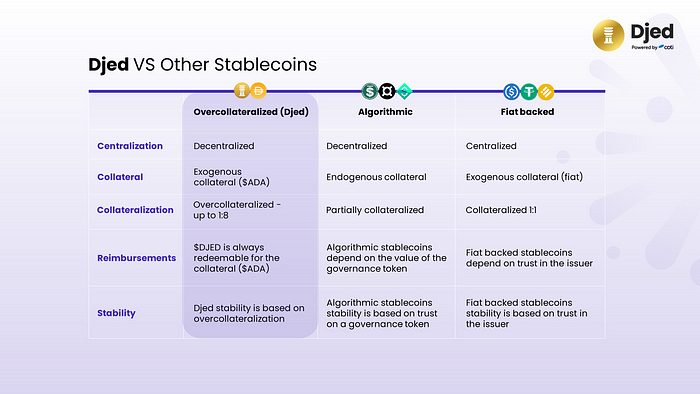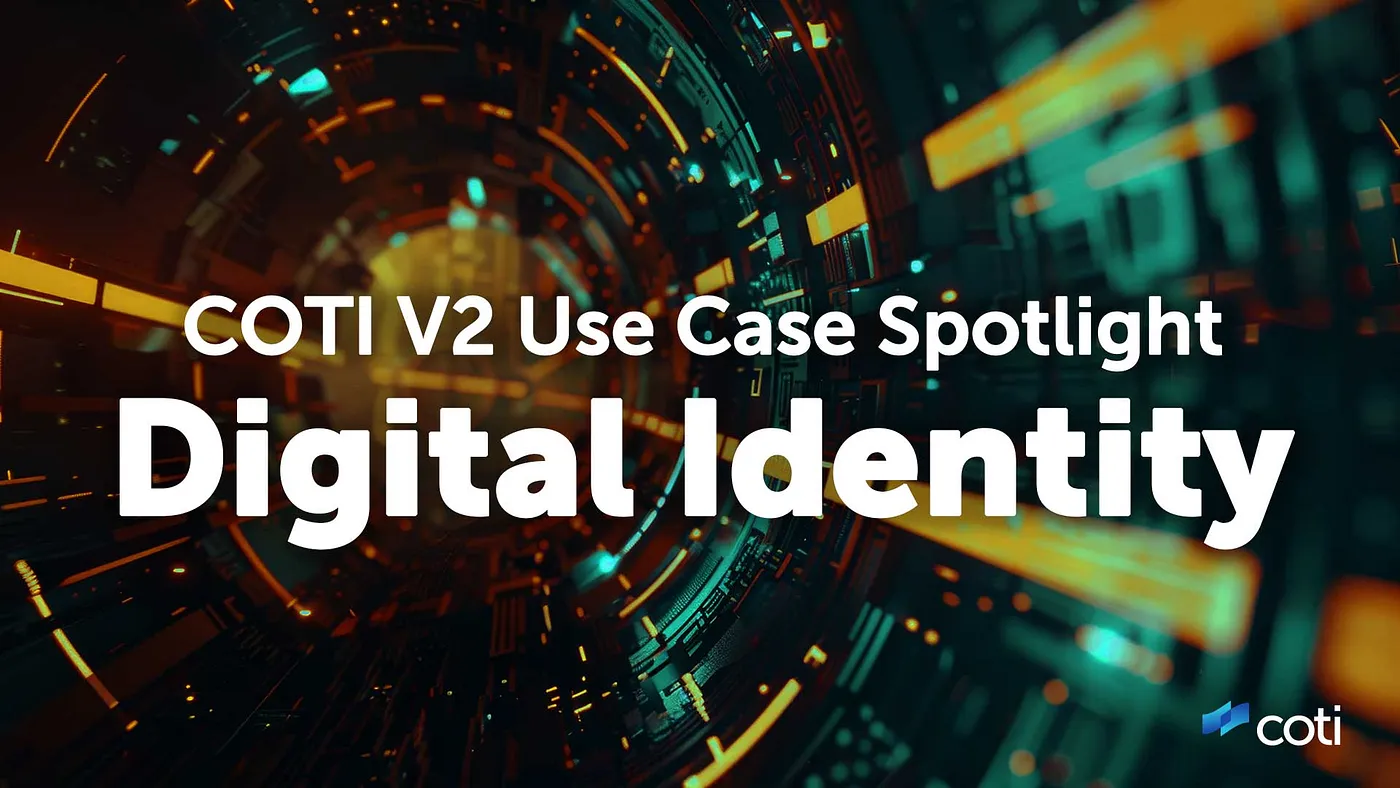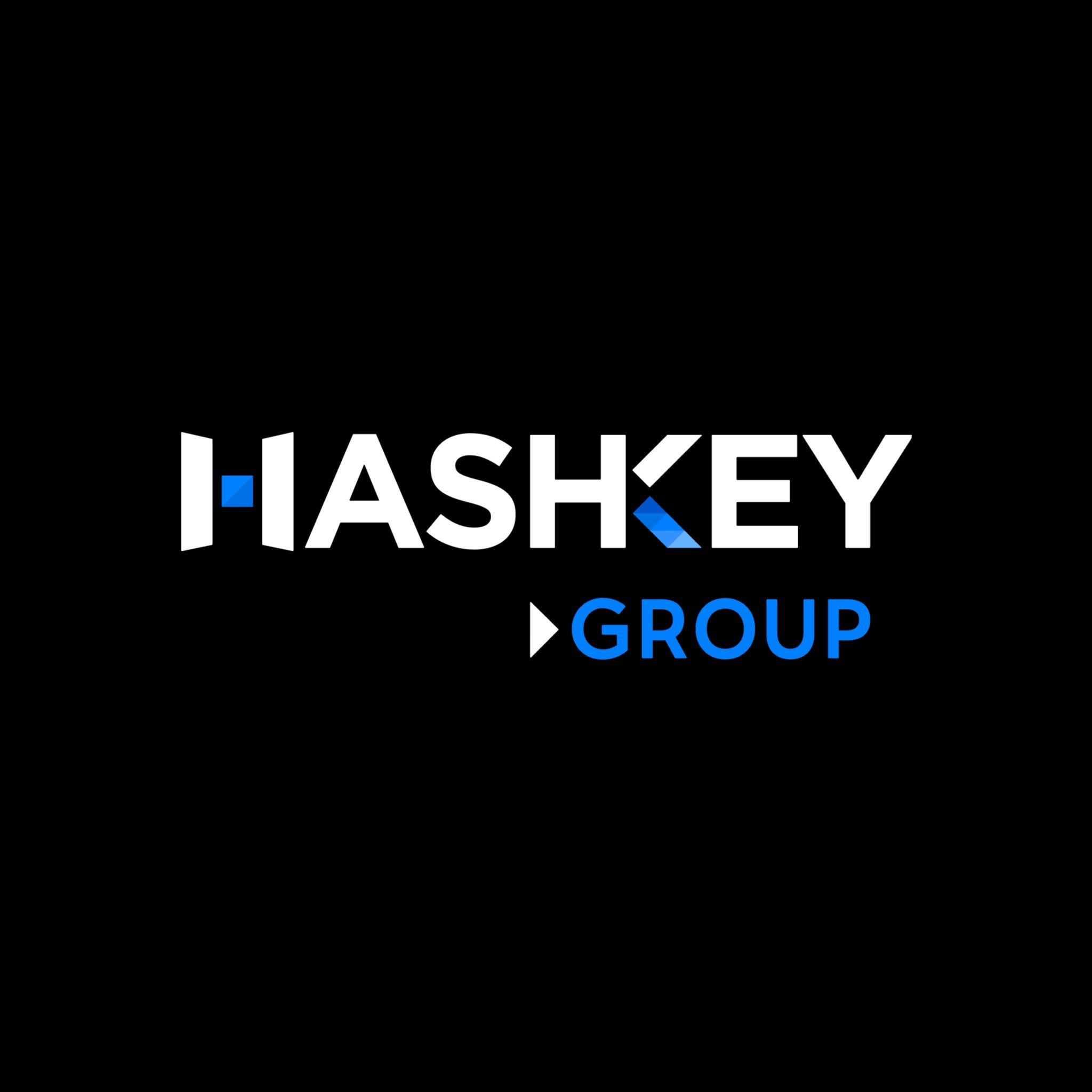Why Djed Should Be Referred to as an Overcollateralized Stablecoin and Not an Algorithmic Stablecoin
As we approach the launch of Djed, we believe it is important to educate more on the category of stablecoin to which Djed belongs.

As we approach the launch of Djed, we believe it is important to educate more on the category of stablecoin to which Djed belongs.
According to its design, $DJED should be referred to as an overcollateralized stablecoin, and not as an algorithmic stablecoin, as also described by Shahaf in his recent video.
Here is why:
There are three main types of stablecoins namely: Fiat backed, Algorithmic and Collateralized stablecoins.
Fiat backed stablecoins are centralized, and their scale factor is 1, meaning that for each $1 you deposit as collateral, you get $1 worth of stablecoin. These stablecoins are backed by actual fiat currencies like the US Dollar, and require centralized trusted off-chain partners and mediators like banks. These stablecoins have single points of failure: censorship risk (the stablecoins may be seized) and regulatory risk, which means that the third party entity requires trust from the users.
Algorithmic stablecoins are decentralized in nature and their stability is based on trust in the governance token. Algorithmic stablecoin usually use endogenous collateral, and are oftentimes undercollateralized.
Collateralized stablecoins are also decentralized and use exogenous collateral, meaning that the collateral that backs the stablecoin has a primary use-case that is separate from the stablecoin project. The amount of collateral determines the level of safety the stablecoin poses.
Let’s examine a number of factors that explains why $DJED belongs to the Collateralized stablecoins category and as such is an overcollateralized stablecoin:
Collateral
An important point to note is that Djed uses exogenous collateral ($ADA). This means that the collateral that backs $DJED, $ADA, has its own utility (its primary use-case is separate from the Djed stablecoin project), and is completely independent of the Djed protocol. This is unlike a typical algorithmic stablecoin that uses endogenous collateral, such as: FRAX, Synthetix and UST. Most algorithmic stablecoins with endogenous collateral are oftentimes undercollateralized, meaning that they have lesser underlying value backing them than the total sum of the assets minted. This is what might lead to them losing their peg.
Collateralization
Collateralization is another factor that stands $DJED out. $DJED is overcollateralized by 400% — 800%, this means that it has 4 to 8 times more underlying value backing it, than the total sum of $DJED minted. Whereas, algorithmic stablecoins are usually partially collateralized or undercollateralized.
Centralization vs Decentralization
It is vital to note that $DJED is fully decentralized, and doesn’t require centralized servers, nor does it involve off-chain partners like banks for transactions. This eliminates censorship risks.
Stability
The stability of $DJED is based on overcollateralization, and not on trust in a governance token. As mentioned above, $DJED is overcollateralized by 4 to 8 times in order to ensure there’s enough $ADA in the contract.
Learn more about Djed’s stability mechanism in this video: https://youtu.be/Dq_1DOrsXGU
Capital Efficiency
In terms of capital efficiency, fiat backed stablecoins’ scale factor is 1. This means that if you deposit $1 as collateral, you receive $1 of stablecoin.
Algorithmic stablecoins have a higher scale factor, they have collateral backing on top of redeemable reserves, however, they are much riskier since they require large scale trust in the stability model, which also depends on the governance token.
Normally, overcollateralized stablecoins are less capital efficient, but $DJED is different, it fixes that flaw with the addition of the $SHEN model, which takes care of the overcollateralization, making $DJED capital efficient.
Reimbursement
$DJED is always redeemable for its collateral ($ADA), unlike algorithmic stablecoins that depend on the value of the governance token. In addition, $1 worth of $ADA, always equals $1 worth of $DJED. This distinguishes $DJED from algorithmic stablecoins.

We believe that the introduction of $DJED will be revolutionary for the stablecoins market. $DJED is the Next Generation Overcollateralized Stablecoin that represents the answer to the pressing needs of the present-day crypto industry, and we strongly believe it has the potential to become the top stablecoin of the Cardano network. It is built on a decentralized system, and its overcollateralization ratio is up to 1:8, Djed is always redeemable for its collateral, it is trustless, and its collateral can be verified on chain by anyone. It is also community driven: with $DJED, the community can mint the reserve token, $SHEN, and holders also get a share of the protocols’ equity pool as an incentive for their participation in maintaining the $DJED peg ratio.
Thus, from this point forward, $DJED should be categorized as an “Overcollateralized Stablecoin”, and not as an algorithmic stablecoin.
Delegate Your Voting Power to FEED DRep in Cardano Governance.
DRep ID: drep12ukt4ctzmtf6l5rj76cddgf3dvuy0lfz7uky08jfvgr9ugaapz4 | We are driven to register as a DRep by our deep dedication to the Cardano ecosystem and our aspiration to take an active role in its development, ensuring that its progress stays true to the principles of decentralization, security, and community empowerment.DELEGATE VOTING POWER!




